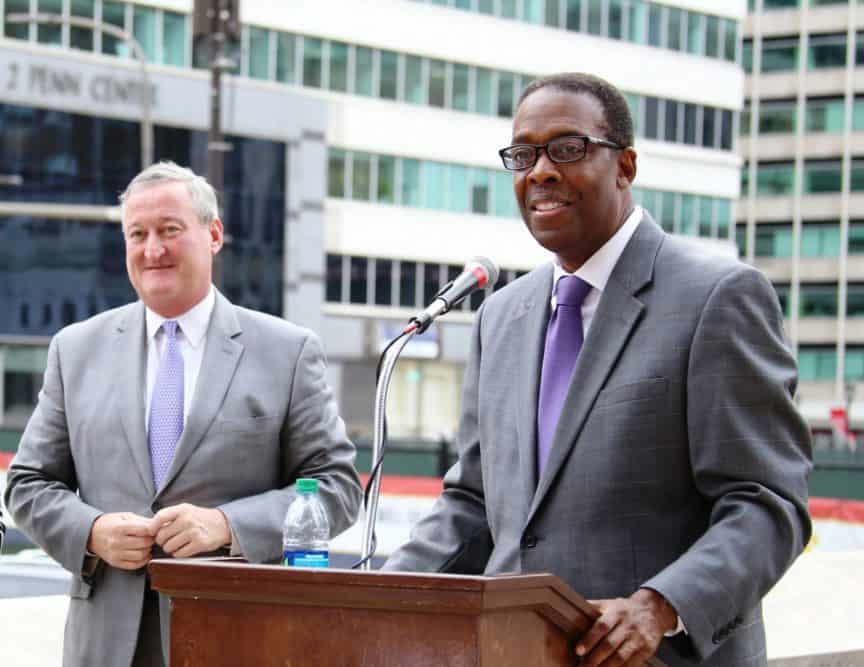Philadelphia, PA – June 23, 2017 – Mayor Jim Kenney and Council President Darrell Clarke (5th District) have submitted the following written testimony to the State Senate Local Government Committee for today’s public hearing on the Philadelphia Beverage Tax:
“In June 2016, after nearly four months of vigorous debate, Philadelphia City Council passed the Philadelphia Beverage Tax and Mayor Jim Kenney signed it into law. The tax was enacted to fund free, quality preschool education for children; expand community schools in high-needs neighborhoods; and launch Rebuild, a $500 million capital improvement program for the City’s parks, recreational centers, and libraries. While several funding alternatives were proposed and considered, an overwhelming majority of City Council determined that a 1.5-cent-per-ounce tax on sugar-sweetened and artificially-sweetened soft drinks was the broadest, fairest funding option, especially in light of the state’s inability to provide significant additional funds for K-12 education or to expand pre-K across the Commonwealth.
Philadelphians support the tax and the programs which it funds. Philadelphia’s prominent community organizations have advocated for the tax, including but not limited to the African-American Chamber of Commerce of Pennsylvania, New Jersey and Delaware; the Philadelphia Opportunities Industrialization Center, or Philadelphia OIC; Ceiba; and Public Citizens for Children and Youth (PCCY). The tax has also been lauded by numerous public health organizations, including the American Heart Association, the American Medical Association, and the American Cancer Society Cancer Action Network. Such taxes are also rapidly growing in popularity across the country, with Cook County, San Francisco, and others passing similar levies shortly after Philadelphia became the first major city to do so.
Despite the relentless opposition to the Philadelphia Beverage Tax by the beverage industry, the City is beginning to reap some of the intended benefits of the tax. To date, the tax has funded 2,000 pre-K seats and provided 4,500 neighborhood public school students and their families with community school supports at nine different schools. The benefits of these two programs are innumerable, particularly for low-income families. Of the families who enrolled in PHLpreK, the average income was $31,776 annually. By enrolling their children in a free, safe, and stable childcare environment, many parents have been able to return to work. Additionally, our investments have created 250 new, living-wage jobs through the PHLpreK program just since January, and allowed pre-K providers to increase wages for current staff. Investing in better staffing improves the quality of education and care for all children enrolled in participating providers, not just those in PHLpreK seats.
The economic benefits of PHLpreK extend beyond these newly created jobs. The program is positively impacting our local economy by creating tremendous growth opportunities for small businesses and driving commerce within the City. The programs rely heavily on the participation of women and minority-owned businesses, which comprise approximately 75% of our pre-K providers. Nearly half of all providers have made facility enhancements that required hiring professional contractors. Further, studies show that pre-K providers and staff tend to spend their earnings locally. The positive impact of PHLpreK, driven by the tax, will continue to be felt in our local economy for years to come.
The City’s new community schools program is equally impactful. Seventy-five percent of our community school students live at or below the poverty line. Community schools support these students by transforming public schools that serve disadvantaged students into neighborhood hubs with services that address the challenges students and their families face that keep them from succeeding academically.
Already, community school coordinators have connected students with job opportunities, made it safer for students to get to and from schools, created programs to offer healthy food and help families facing hunger, offered parenting classes to teens raising children, raised money for library renovations, launched a community mural project, founded a male mentoring program, expanded afterschool activities, established clothing banks, and increased access to winter clothes.
Over the next five years, these programs will grow to support 6,500 pre-K students and 25 community schools, and the benefits mentioned above will only multiply. However, the harsh opposition from the beverage industry continues to restrain the full implementation and expansion of these programs. The longer we wait to fully implement these programs, the more children will miss out on the opportunity to benefit from these valuable early supports.
The third program funded by the Philadelphia Beverage Tax, Rebuild, will begin this summer. Rebuild is the largest infrastructural investment in the history of the City. Rebuild will improve 150 to 200 neighborhood parks, libraries, recreation centers, and playgrounds with the goals of promoting equity and encouraging economic growth across the city. These improvements are also expected to promote educational opportunities for children, support healthy lifestyles for all, improve public safety in our shared spaces, and create jobs for Philadelphians. One of Rebuild’s three primary goals is creating a sustainable workforce development model for diversifying the building trades. Accordingly, Rebuild’s $500 million investment will connect cohorts of under-employed Philadelphians, many from communities that have suffered from historical discrimination, with jobs and access to lifelong, family-sustaining careers.
However, all of this progress will disappear if the beverage industry is successful in their continued efforts to repeal this tax, either through courts or legislation. It is surprising that elected representatives of a state facing a $3 billion dollar deficit would seek to interfere with a local funding solution to solve universal challenges. Given the Commonwealth’s dire fiscal challenges, the City of Philadelphia — which has continued to pass balanced budgets and increase investments in our children, while actually lowering taxes in the next fiscal year – has focused more on local solutions. We respectfully ask the General Assembly to allow the City of Philadelphia the autonomy we need, and frankly deserve, to improve the lives of our residents.
Thank you for the opportunity to submit this written testimony.”
Testimony for State Hearing on the Philadelphia Beverage Tax 6-23-2017
# # #


